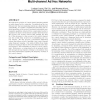Free Online Productivity Tools
i2Speak
i2Symbol
i2OCR
iTex2Img
iWeb2Print
iWeb2Shot
i2Type
iPdf2Split
iPdf2Merge
i2Bopomofo
i2Arabic
i2Style
i2Image
i2PDF
iLatex2Rtf
Sci2ools
WISEC
2009
ACM
2009
ACM
Mitigating control-channel jamming attacks in multi-channel ad hoc networks
We address the problem of control-channel jamming attacks in multi-channel ad hoc networks. Deviating from the traditional view that sees jamming attacks as a physical-layer vulnerability, we consider a sophisticated adversary who exploits knowledge of the protocol mechanics along with cryptographic quantities extracted from compromised nodes to maximize the impact of his attack on higher-layer functions. We propose new security metrics that quantify the ability of the adversary to deny access to the control channel, and the overall delay incurred in re-establishing the control channel. We also propose a randomized distributed scheme that allows nodes to establish a new control channel using frequency hopping. Our method differs from classic frequency hopping in that no two nodes share the same hopping sequence, thus mitigating the impact of node compromise. Furthermore, a compromised node is uniquely identified through its hop sequence, leading to its isolation from any future info...
| Added | 19 May 2010 |
| Updated | 19 May 2010 |
| Type | Conference |
| Year | 2009 |
| Where | WISEC |
| Authors | Loukas Lazos, Sisi Liu, Marwan Krunz |
Comments (0)

